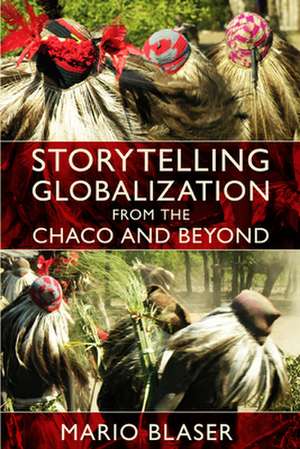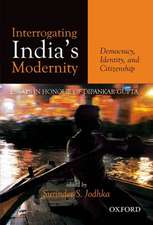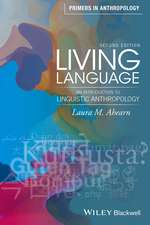Storytelling Globalization from the Chaco and Beyond: New Ecologies for the Twenty-First Century
Autor Mario Blaseren Limba Engleză Paperback – 6 sep 2010
Din seria New Ecologies for the Twenty-First Century
-
 Preț: 216.79 lei
Preț: 216.79 lei -
 Preț: 242.16 lei
Preț: 242.16 lei -
 Preț: 215.49 lei
Preț: 215.49 lei -
 Preț: 192.18 lei
Preț: 192.18 lei -
 Preț: 193.27 lei
Preț: 193.27 lei -
 Preț: 301.38 lei
Preț: 301.38 lei -
 Preț: 346.65 lei
Preț: 346.65 lei -
 Preț: 303.11 lei
Preț: 303.11 lei -
 Preț: 305.08 lei
Preț: 305.08 lei - 23%
 Preț: 774.98 lei
Preț: 774.98 lei -
 Preț: 264.26 lei
Preț: 264.26 lei - 19%
 Preț: 604.40 lei
Preț: 604.40 lei -
 Preț: 262.32 lei
Preț: 262.32 lei - 19%
 Preț: 635.15 lei
Preț: 635.15 lei -
 Preț: 260.41 lei
Preț: 260.41 lei -
 Preț: 266.18 lei
Preț: 266.18 lei -
 Preț: 264.05 lei
Preț: 264.05 lei -
 Preț: 225.09 lei
Preț: 225.09 lei -
 Preț: 260.41 lei
Preț: 260.41 lei
Preț: 261.93 lei
Nou
Puncte Express: 393
Preț estimativ în valută:
50.13€ • 54.43$ • 42.11£
50.13€ • 54.43$ • 42.11£
Carte tipărită la comandă
Livrare economică 23 aprilie-07 mai
Preluare comenzi: 021 569.72.76
Specificații
ISBN-13: 9780822345459
ISBN-10: 0822345455
Pagini: 320
Ilustrații: 3 maps, 2 figures
Dimensiuni: 156 x 230 x 22 mm
Greutate: 0.4 kg
Editura: MD – Duke University Press
Seria New Ecologies for the Twenty-First Century
ISBN-10: 0822345455
Pagini: 320
Ilustrații: 3 maps, 2 figures
Dimensiuni: 156 x 230 x 22 mm
Greutate: 0.4 kg
Editura: MD – Duke University Press
Seria New Ecologies for the Twenty-First Century
Cuprins
About the Series; Map List; Preface Introduction. Globalization and the Struggle for Worlds and Knowledges Otherwise Part One. Puruhle/Genealogies 1. Laissez-Faire Progress: Invisibilizing the Yrmo; 2. State-Driven Development: Stabilizing Modernity; 3. Sustainable Development: Modernity Unravels? Part Two. Porowo/Moralities 4. Enacting the Yrmo; 5. Taming Differences Part Three. Azle/Translations 6. Translating Neoliberalism; 7. A World in which Many Worlds (Are Forced to) Fit ; 8. Becoming the Yshiro Nation; 9. Reality Check Conclusion: Eisheraho/Renewal
Recenzii
"By intertwining stories told by yshiro interlocutors and fragments of yshiro myth-history with his own critical analysis, he sensitizes the reader to the relational moral logic through which the yshiro continue to assert their own life projects (including their ideas about relations between humans and non-humans) against the ways in which the international development apparatus strives to tame difference and reproduces the oloniality of power. This encourages us to think about how indigenous practices might sustain a pluriverse in which fundamental ontological conflicts are persistent despite social change....This is an important contribution to anthropological efforts to go beyond critical analysis of development towards a deeper understanding of such projects." John Gledhill, Journal of the Royal Anthropological Institute
"In this instructive and original work, modernity and the drama of globalization offer a historical horizon in relation to which both the activity of the anthropologist and the problems faced by the Yshiro communities in Paraguay are explored. Border dialogue (perhaps even border anthropology) is born precisely in the encounter between modern globalizing tendencies and the opening up of a different global imaginary, one rooted in the reality of there being many epistemic and social worlds.--Nelson Maldonado-Torres, author of Against War: Views from the Underside of Modernity
Mario Blasers talented and deeply insightful storytelling opens up paths into the transition from modernity to globality. Storytelling Globalization from the Chaco and Beyond is a work of depth, scholarship, and hopefulness. Blasers years of learning and collaborating with the Yshiro people of the Paraguayan Chaco have pressed him to ask questions that destabilize much of the taken-for-granted knowledge of the Euromodern academy. With his research interlocutor Don Veneto Vera to prod him into dialogical investigations of relational ontologies in the pluriverse, Blaser brings us, the readers, into places where incisiveness, analysis, and passionate commitment converge. This book demonstrates and enacts the power of strong stories: to change our understandings, to open other worlds, to give us untamed glimpses of substantive alternatives for life on Earth.--Deborah Bird Rose, author of Reports from a Wild Country: Ethics for Decolonisation
When the rest meets the West, are the modern stories enough? In this deeply disturbing and thought-provoking book, Mario Blaser shows that for the marginalized and exploited, the world is storied and materialized quite differently. Forced to recognize that hegemonic Western knowledges, institutions, and worlds deny those realities, Blaser tells a destabilizing but ultimately affirmative story that is simultaneously analytical, political, and ontological. This superb book will be compulsory reading for all students of anthropology, development studies, postcolonialism, and science and technology studies.--John Law, author of After Method: Mess in Social Science Research
Storytelling Globalization from the Chaco and Beyond is an anthropological tour de force with strong philosophical, political, epistemic, and ontological implications. Mario Blaser shifts the geopolitics of knowing and reasoning by looking at globalization not only from the South but also and mainly through the eyes of those who endure its consequences. In the narratives Blaser presents, border thinking takes on new dimensions and is shown to be an essential aspect of de-colonial thought. Notions about objectivity and universal truth necessarily give way to a recognition of ontological diversity.--Walter D. Mignolo, author of The Idea of Latin America
"By intertwining stories told by yshiro interlocutors and fragments of yshiro myth-history with his own critical analysis, he sensitizes the reader to the relational moral logic through which the yshiro continue to assert their own 'life projects' (including their ideas about relations between humans and non-humans) against the ways in which the international development apparatus strives to 'tame difference' and reproduces the oloniality of power. This encourages us to think about how indigenous practices might sustain a 'pluriverse' in which fundamental ontological conflicts are persistent despite social change...This is an important contribution to anthropological efforts to go beyond critical analysis of development towards a deeper understanding of such projects." John Gledhill, Journal of the Royal Anthropological Institute "In this instructive and original work, modernity and the drama of globalization offer a historical horizon in relation to which both the activity of the anthropologist and the problems faced by the Yshiro communities in Paraguay are explored. Border dialogue (perhaps even border anthropology) is born precisely in the encounter between modern globalizing tendencies and the opening up of a different global imaginary, one rooted in the reality of there being many epistemic and social worlds."--Nelson Maldonado-Torres, author of Against War: Views from the Underside of Modernity "Mario Blaser's talented and deeply insightful storytelling opens up paths into the transition from modernity to globality. Storytelling Globalization from the Chaco and Beyond is a work of depth, scholarship, and hopefulness. Blaser's years of learning and collaborating with the Yshiro people of the Paraguayan Chaco have pressed him to ask questions that destabilize much of the taken-for-granted knowledge of the Euromodern academy. With his research interlocutor Don Veneto Vera to prod him into dialogical investigations of relational ontologies in the pluriverse, Blaser brings us, the readers, into places where incisiveness, analysis, and passionate commitment converge. This book demonstrates and enacts the power of strong stories: to change our understandings, to open other worlds, to give us untamed glimpses of substantive alternatives for life on Earth."--Deborah Bird Rose, author of Reports from a Wild Country: Ethics for Decolonisation "When 'the rest' meets 'the West,' are the modern stories enough? In this deeply disturbing and thought-provoking book, Mario Blaser shows that for the marginalized and exploited, the world is storied and materialized quite differently. Forced to recognize that hegemonic Western knowledges, institutions, and worlds deny those realities, Blaser tells a destabilizing but ultimately affirmative story that is simultaneously analytical, political, and ontological. This superb book will be compulsory reading for all students of anthropology, development studies, postcolonialism, and science and technology studies."--John Law, author of After Method: Mess in Social Science Research "Storytelling Globalization from the Chaco and Beyond is an anthropological tour de force with strong philosophical, political, epistemic, and ontological implications. Mario Blaser shifts the geopolitics of knowing and reasoning by looking at globalization not only from the South but also and mainly through the eyes of those who endure its consequences. In the narratives Blaser presents, border thinking takes on new dimensions and is shown to be an essential aspect of de-colonial thought. Notions about 'objectivity' and 'universal truth' necessarily give way to a recognition of ontological diversity."--Walter D. Mignolo, author of The Idea of Latin America "The book embeds the specific situations in the political and economic context of Paraguay, while posing challenging questions to multiculturalism." - Silvia Hirsch, BLAR, Vol 32, No 1, January 2013
"In this instructive and original work, modernity and the drama of globalization offer a historical horizon in relation to which both the activity of the anthropologist and the problems faced by the Yshiro communities in Paraguay are explored. Border dialogue (perhaps even border anthropology) is born precisely in the encounter between modern globalizing tendencies and the opening up of a different global imaginary, one rooted in the reality of there being many epistemic and social worlds.--Nelson Maldonado-Torres, author of Against War: Views from the Underside of Modernity
Mario Blasers talented and deeply insightful storytelling opens up paths into the transition from modernity to globality. Storytelling Globalization from the Chaco and Beyond is a work of depth, scholarship, and hopefulness. Blasers years of learning and collaborating with the Yshiro people of the Paraguayan Chaco have pressed him to ask questions that destabilize much of the taken-for-granted knowledge of the Euromodern academy. With his research interlocutor Don Veneto Vera to prod him into dialogical investigations of relational ontologies in the pluriverse, Blaser brings us, the readers, into places where incisiveness, analysis, and passionate commitment converge. This book demonstrates and enacts the power of strong stories: to change our understandings, to open other worlds, to give us untamed glimpses of substantive alternatives for life on Earth.--Deborah Bird Rose, author of Reports from a Wild Country: Ethics for Decolonisation
When the rest meets the West, are the modern stories enough? In this deeply disturbing and thought-provoking book, Mario Blaser shows that for the marginalized and exploited, the world is storied and materialized quite differently. Forced to recognize that hegemonic Western knowledges, institutions, and worlds deny those realities, Blaser tells a destabilizing but ultimately affirmative story that is simultaneously analytical, political, and ontological. This superb book will be compulsory reading for all students of anthropology, development studies, postcolonialism, and science and technology studies.--John Law, author of After Method: Mess in Social Science Research
Storytelling Globalization from the Chaco and Beyond is an anthropological tour de force with strong philosophical, political, epistemic, and ontological implications. Mario Blaser shifts the geopolitics of knowing and reasoning by looking at globalization not only from the South but also and mainly through the eyes of those who endure its consequences. In the narratives Blaser presents, border thinking takes on new dimensions and is shown to be an essential aspect of de-colonial thought. Notions about objectivity and universal truth necessarily give way to a recognition of ontological diversity.--Walter D. Mignolo, author of The Idea of Latin America
"By intertwining stories told by yshiro interlocutors and fragments of yshiro myth-history with his own critical analysis, he sensitizes the reader to the relational moral logic through which the yshiro continue to assert their own 'life projects' (including their ideas about relations between humans and non-humans) against the ways in which the international development apparatus strives to 'tame difference' and reproduces the oloniality of power. This encourages us to think about how indigenous practices might sustain a 'pluriverse' in which fundamental ontological conflicts are persistent despite social change...This is an important contribution to anthropological efforts to go beyond critical analysis of development towards a deeper understanding of such projects." John Gledhill, Journal of the Royal Anthropological Institute "In this instructive and original work, modernity and the drama of globalization offer a historical horizon in relation to which both the activity of the anthropologist and the problems faced by the Yshiro communities in Paraguay are explored. Border dialogue (perhaps even border anthropology) is born precisely in the encounter between modern globalizing tendencies and the opening up of a different global imaginary, one rooted in the reality of there being many epistemic and social worlds."--Nelson Maldonado-Torres, author of Against War: Views from the Underside of Modernity "Mario Blaser's talented and deeply insightful storytelling opens up paths into the transition from modernity to globality. Storytelling Globalization from the Chaco and Beyond is a work of depth, scholarship, and hopefulness. Blaser's years of learning and collaborating with the Yshiro people of the Paraguayan Chaco have pressed him to ask questions that destabilize much of the taken-for-granted knowledge of the Euromodern academy. With his research interlocutor Don Veneto Vera to prod him into dialogical investigations of relational ontologies in the pluriverse, Blaser brings us, the readers, into places where incisiveness, analysis, and passionate commitment converge. This book demonstrates and enacts the power of strong stories: to change our understandings, to open other worlds, to give us untamed glimpses of substantive alternatives for life on Earth."--Deborah Bird Rose, author of Reports from a Wild Country: Ethics for Decolonisation "When 'the rest' meets 'the West,' are the modern stories enough? In this deeply disturbing and thought-provoking book, Mario Blaser shows that for the marginalized and exploited, the world is storied and materialized quite differently. Forced to recognize that hegemonic Western knowledges, institutions, and worlds deny those realities, Blaser tells a destabilizing but ultimately affirmative story that is simultaneously analytical, political, and ontological. This superb book will be compulsory reading for all students of anthropology, development studies, postcolonialism, and science and technology studies."--John Law, author of After Method: Mess in Social Science Research "Storytelling Globalization from the Chaco and Beyond is an anthropological tour de force with strong philosophical, political, epistemic, and ontological implications. Mario Blaser shifts the geopolitics of knowing and reasoning by looking at globalization not only from the South but also and mainly through the eyes of those who endure its consequences. In the narratives Blaser presents, border thinking takes on new dimensions and is shown to be an essential aspect of de-colonial thought. Notions about 'objectivity' and 'universal truth' necessarily give way to a recognition of ontological diversity."--Walter D. Mignolo, author of The Idea of Latin America "The book embeds the specific situations in the political and economic context of Paraguay, while posing challenging questions to multiculturalism." - Silvia Hirsch, BLAR, Vol 32, No 1, January 2013
Notă biografică
Textul de pe ultima copertă
"In this instructive and original work, modernity and the drama of globalization offer a historical horizon in relation to which both the activity of the anthropologist and the problems faced by the Yshiro communities in Paraguay are explored. Border dialogue (perhaps even border anthropology) is born precisely in the encounter between modern globalizing tendencies and the opening up of a different global imaginary, one rooted in the reality of there being many epistemic and social worlds.""--"Nelson Maldonado-Torres, author of "Against War: Views from the Underside of Modernity"
Descriere
Ethnography of the storytelling practices through which the indigenous Yshiro of Paraguay struggle to produce an alternative reality/world to the so-far dominant type of globalization that is 'modernity writ large'















